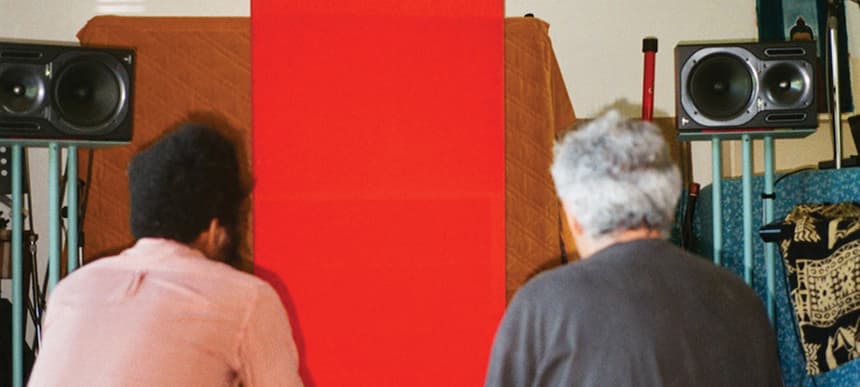
Found Sound: Ariel Kalma & Robert Lowe
RVNG Intl.'s FRKWYS series has made some unlikely but excellent pairings between artists and generations across its 12 volumes so far – The Congos with Sun Araw, David Borden with James Ferraro, Laurel Halo, Sam Godin, and Daniel Lopatin, etc. Their latest brings together Ariel Kalma and Robert Lowe for 'We Know Each Other Somehow', a luscious, six-track album of ambient atmospheres and field recordings.
Kalma has been making music since the late 1960s, but much of it would have remained little known (unless you travelled in the right circles, anyway) if it weren't for the release of RVNG's 'An Evolutionary Music' compilation last year, a reissue project which collected some of his experimental early electronic music and jazz, aimed at rediscovering and reappraising his long career.
Lowe has been releasing music both under his own name and as Lichens with respected underground labels like Kranky, Type, and Thrill Jockey for years. Before that, he was a member of cult post-rock group 90 Day Men.
'We Know Each Other Somehow' was conceived while Lowe was touring across Australia. Kalma's calm, rural lifestyle imbued the record with a slowness through the sounds of birdsong, creeks, and the ambient sounds of silence. These field recordings are described as the "collective voice" in the album's liner notes, and the process with which they were captured can be seen in a feature-length documentary about the album, Sunshine Soup.
Wanting to know more about the collective voice, we also spoke to Kalma and Lowe over email about their recording process. They sent us the found sound of birdsong and talked about its usage in album track Miracle Mile.
Can you talk us through the Found Sound that you've sent us?
Ariel Kalma: "I have a good ear for birds, and while Robert and I were in the studio, I noticed a flock of birds nearby which 'sung' a sweet repetitive melody… I set my portable recorder on a tree trunk and we went for a walk."
How did you use the birdsong in Miracle Mile?
Ariel Kalma: "We had to tune the synthesizer and saxophone to the birds as they were not in harmony with the fixed keyboard tuning. Then we played simple layers on top and I improvised on sax, sometimes repeating the bird riffs, sometimes playing variations of the birds' sentences. That was arduous. So for our concerts I have retuned the birds to make it easier to play live on top."
When did you start taking field recordings originally?
Ariel Kalma: "During my first trip to India in 1974 I had a cassette recorder and got great ambient sounds from markets and nature, but then my machine broke down, and my cassettes were ruined by mold… I still miss those recordings! After I produced the LP 'Osmose' in 1978, I had a new taste for field recording, always carrying a portable recorder for birds, brooks, and also churches bells, trains, road traffic – anything sounding interesting, really. Then I would mix it with my music."
Robert Lowe: "Having been raised in urban environments, I started using cassette recorders when I was younger to capture moments – social environments and street sounds (both in the day and middle of the night). I have always been a fan of nature recordings, but early on never found myself in such situations. I thought it was important for me to document my surroundings but in abstract ways. The content would outweigh the context."
Do you have a set process that you generally use when field recording? Was it different for this record at all?
Ariel Kalma: "When I find a field sound I usually go for a walk, or sit very, very quiet so nature gets undisturbed again. That's when things get interesting. And that's what we did for Miracle Mile."
Robert Lowe: "My process throughout the years has generally remained the same. Even while recording solo endeavors, the recording is a live, real time documentation of my state of being at that moment. Within the confines of recording this record, the application didn't shift so much. It is still the action of recording a moment within my current environment."
Found Sound is interesting as people have all sorts of reason for using them – some people will use words like 'personal' or 'organic', some people like capturing the ephemeral, some people just like interesting sounds. Why do you find yourself drawn to them?
Ariel Kalma: "Nature is missing in our modern environment, but we need it to refresh our beings. On top of it, those sounds are different from 'music' and therefore become interesting for our brains. So recordings of nature brings a relaxing ambient sound."
Do you have a 'special ear' where you're looking for sounds to record, or do you record the environment first and zone in on sounds after the fact?
Ariel Kalma: "I hear all kinds of things all the time… then comes a special sound which tickle my imagination, I can hear drones, or a melody, or rhythms that I could work with. If I can record that fleeting moment, I feel lucky! Then I will (at one point in time) work on a composition which features those sounds."
What is your favourite sound in the world?
Ariel Kalma: "Nature, undisturbed, any time of the day (or night in a rainforest). It contains the vital forces of various creatures celebrating life in their own way. When I listen I feel part of the Earth Symphony of Nature."
Robert Lowe: "The human voice in a large reverberant space is probably my favorite sound. The way one can shift words and tones feels marvelous to me. No matter the person or the voice, something interesting can be found within."
RVNG Intl. released 'We Know Each Other, Somehow' on April 14th 2015 (buy).













